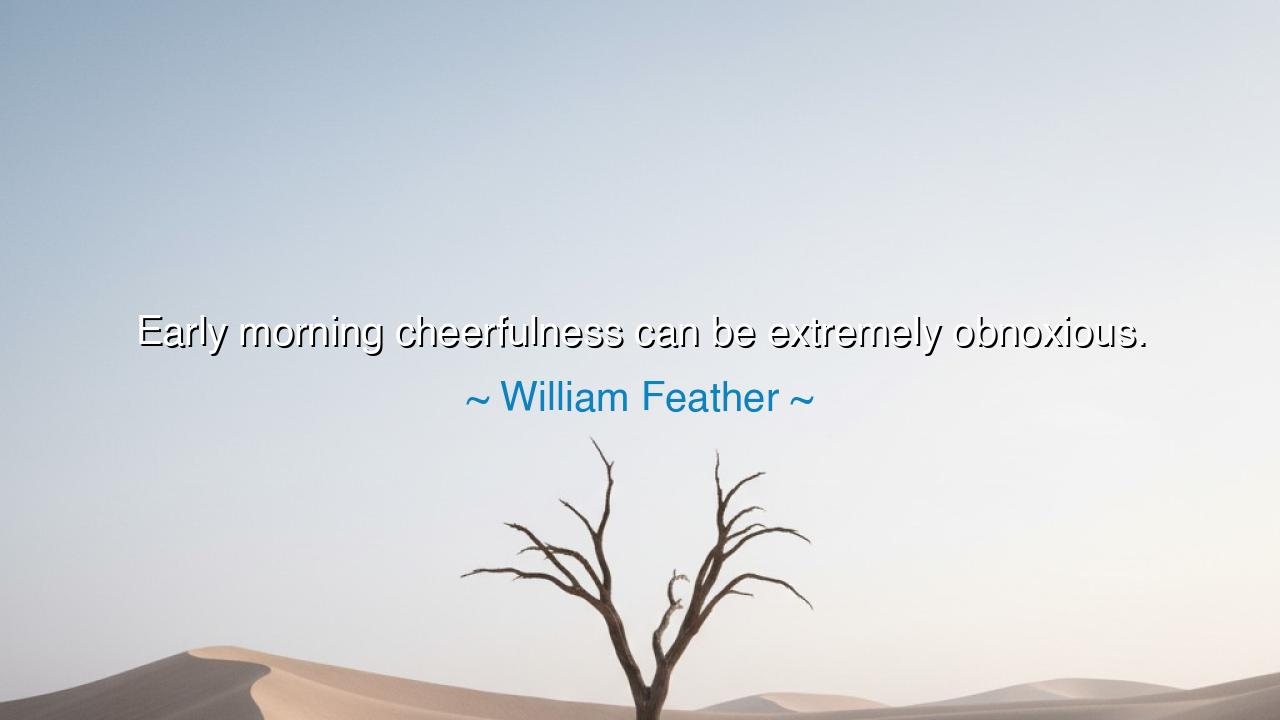
Early morning cheerfulness can be extremely obnoxious.






The wit of William Feather once struck a sharp chord when he remarked: “Early morning cheerfulness can be extremely obnoxious.” Though dressed in humor, these words carry a truth that speaks to the rhythm of human nature. Not all hearts rise with the sun, and the forced brightness of others can feel like a storm upon a still lake. Feather, a writer who often observed the subtleties of daily life, captured in this saying both the comedy and the reality of how people meet the dawn differently.
This quote reminds us that joy, though good, must be tempered by awareness of others. For one man’s song at sunrise can be another man’s torment. It is not that cheerfulness is wrong, but that timing and sensitivity matter. Ancient sages often taught that wisdom is not only in what we say, but in when we say it. Even the noblest truth, if spoken at the wrong hour, can wound rather than heal. Feather’s jest points to this deeper wisdom: enthusiasm, like fire, must be tended carefully, or it burns instead of warms.
History gives us examples of this truth. Consider the Stoics, who prized moderation in all things. They warned against excess—even in joy—for unbalanced expression could disrupt harmony. Likewise, in military life, stories abound of soldiers who, after long marches through the night, despised the overly eager comrade who greeted dawn with cheer while others longed for silence and rest. The lesson is clear: even virtues, when unmeasured, can become irritants.
Feather’s humor also reflects the human struggle with mornings. For centuries, poets and philosophers have noted the divide between those who spring forth with energy and those who rise slowly, their spirits gathering strength like the sun itself climbing the horizon. The clash between these two natures—the early riser radiant with cheer, the slow waker wrapped in silence—is a drama as old as time. It is here that “obnoxiousness” is born, not from malice, but from the friction of differing souls.
The meaning of this quote lies in its balance of jest and truth. It is a reminder that even joy can weary others if not shared with gentleness. It warns us that self-expression, however pure, must consider the state of those around us. For what is virtue without empathy? To be truly cheerful is not to overflow blindly, but to bring light in a way that others can receive.
From this, the lesson we may take is twofold: let those who wake with cheer carry it humbly, offering it as a gift, not a demand; and let those who wake in silence receive the joy of others with patience, remembering that light, though sometimes blinding at first, is still a blessing. Practical wisdom is found in this harmony: greet the day in your own way, but respect the ways of others.
Thus, William Feather’s quote endures not only as humor, but as counsel. It teaches us that the dance of human interaction requires awareness, that cheerfulness must be guided by kindness, and that mornings, like life itself, are best lived with both joy and respect. Let us then rise each day mindful of others, spreading cheer not as a flood, but as a gentle light that brightens without blinding.






AAdministratorAdministrator
Welcome, honored guests. Please leave a comment, we will respond soon